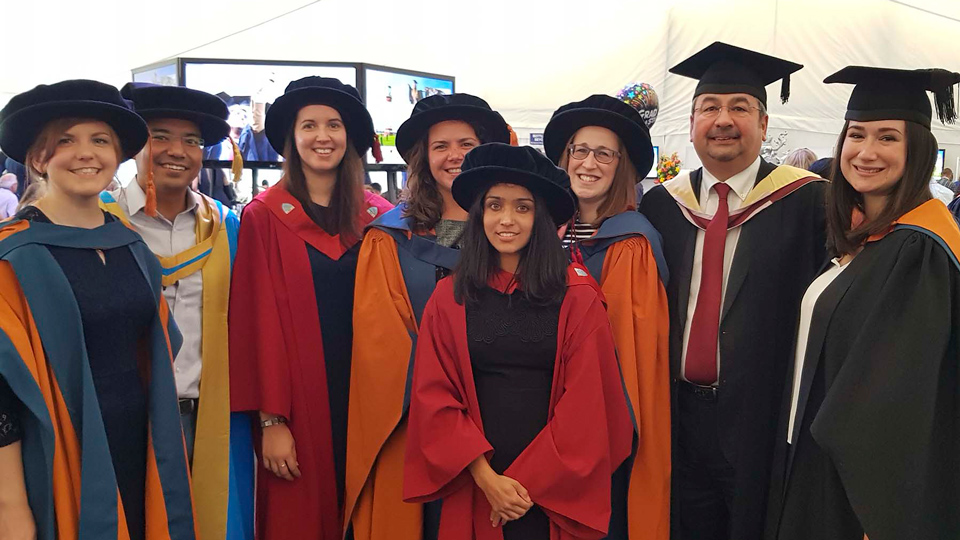- OT
- Life in practice
- Practitioner stories
- I could not live without…the optometry team at my university
I could not live without…
The optometry team at my university
Third-year optometry student at the University of Plymouth and AOP Council member, Luke McRoy-Jones, discusses how the optometry team is invaluable for his studies

17 November 2019
As a student optometrist, I am still constantly learning in terms of optical knowledge and my clinical skills.
Your student years are an exciting time because you learn about the subject you are passionate about. However, they can also be very tough, and it can be overwhelming at times due to a high level of content and the requirement to master (sometimes) tricky techniques. Your ability to conquer these techniques will rely on those you have teaching you and the support network that you have around you.
At the University of Plymouth, my peers and I are lucky to have a knowledgeable, supportive and dynamic team around us. The excellent level of teaching means that we benefit from being a student here and we get the most out of our university years.
At the University of Plymouth, my peers and I are lucky to have a knowledgeable, supportive and dynamic team around us
Optometry at Plymouth
The optometry programme at the University of Plymouth has been running since 2011 when it was established to combat recruitment issues for optometrists in the South West. Today it is fully General Optical Council (GOC)-accredited and admits around 70 new students each year, meaning that there is currently a student body of around 200 optometry undergraduates.
The programme will benefit from new facilities in the next couple of years, as the university seeks to relocate the School of Health Professions into a new building in Plymouth City Centre.
It’s all about the teaching
The structure of the programme means that most of the theoretical content is covered in the first two years, while the third year is very much about honing your clinical skills and acquiring ‘safe’ GOC episodes and signing off competencies.
As a result, the third year is based at the university’s on-campus eye clinic, the Centre for Eyecare Excellence (CEE). A public facing optometry clinic, the practice sees real patients and runs specialist clinics ranging from binocular vision, low vision, myopia control and further investigative techniques.
Teaching on the programme relies on an academic team who is pivotal in the first two years of study. The academic team at Plymouth is made up entirely of qualified optometrists, many with additional research qualifications. Together they have formed an Eye and Vision Research Group at the university, which brings together all of their research interests.
Having a lecturing team that has a heavy research focus means that a lot of the teaching is well informed by current research. The team is keen to push us, as individuals, to link research to our clinical skills and use it to consider why we perform certain tests and techniques. As a healthcare professional and an optometrist, this kind of thinking is crucial, allowing for the use of evidence-based practice.

Our lecturers are very supportive and will offer advice and pastoral assistance. We are on a first name basis with all of our lecturers and they always make an effort to interact and check how you’re doing. As a result, the programme feels very small and close knit, even though it has grown considerably in size over the past couple of years.
The school welcomes visiting lecturers who deliver elements of the programme. For example, for the second year Disease and Pharmacology module, some teaching is delivered by hospital optometrists and ophthalmologists, which reinforces our lecturers’ expertise.
In addition, companies such as Hoya and Essilor visit for dispensing elements of teaching, providing industry and technical insight into what we’re learning. Overall, the programme is keen to draw on the expertise of optical professionals in the South West, where Plymouth was the pioneer course.
The team is also dynamic and so we are also taught topics and modules by lecturers who have expertise, experience or have done research in that area of optometry, which comes through in the passion of the teaching
In clinic
In the third year when students are based at the CEE, learning is reinforced by a team of clinical tutors. This team includes optometrists, orthoptists and dispensing opticians. Some of these clinical tutors are past graduates of Plymouth so they have recent experience of being a student.
They are instrumental in helping students refine their clinical skills and routine. They are very supportive and give individual feedback, while pushing you to learn and develop as a student optometrist.
The clinical tutors provide students with online feedback using e-learning platform PebblePad and always encourage us to reflect on our performance and carry forward any suggested improvements.
Overall, I think one of the most pleasing aspects of the course is how the programme team listens to us. They very much see students as partners and through regular staff-student liaison meetings and feedback, we are able to help inform different elements of the programme to ensure we get the most out of it. From starting the course in September 2017, I’ve already seen many positive changes put in place.
I believe the optometry team at the University of Plymouth to be second to none in delivering an optometry programme that pushes you and allows you to get the most out of being a student optometrist. Due to the way in which the programme has been delivered and the knowledge and skills I have acquired, I will be proud to be a Plymouth graduate and I know that I will always draw on the ways of thinking that I’ve developed at university.


Comments (0)
You must be logged in to join the discussion. Log in